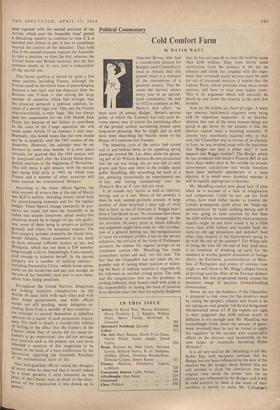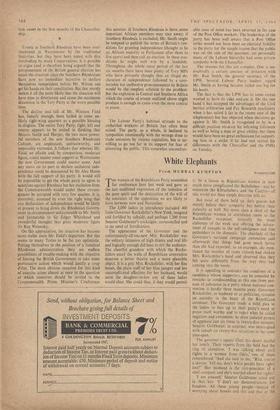Political Commentary
Cold Comfort Farm
By DAVID WATT The. wheeling cycle of the zodiac had turned and lo and behold there, in his appalling spring plumage, crowed Mr. Leo Abse, while the gleam-: ing pelt of Sir William Robson-Brown proclaimed that the sap Was rising; the air was full of mild grunts and baas and • there in. the middle stood gaffer Maudling, idly scratching the back of a tax, plucking occasionally an experimental ear of fact and staring ruminatively over the Dispatch Box as if time did not exist.
It all sounds very idyllic as well as infinitely boring; and so it was. Many of the animals, it must be said, seemed perfectly content. A large number of them breathed a deep sigh, of relief that at least, as one of them put it, 'Reggie hasn't done a Ted Heath on us.' No nonsense here about modernisation or controversial changes in the tax structure. At every point at which difficulty and argument might have crept in—the introduc-' tion of a general betting tax, the reorganisation of taxes on company profits, a tax on the service industries, the revision of the fcirm of Exchequer accounts, the scheme for regular savings on an instalment system—Mr. Maudling has made sympathetic noises and said, 'not this year.' The fact that the Chancellor has not taken the un- popular step of raising direct taxation or widen- ing the basis' of indirect taxation is regarded by his followers as another strong point. The rank and file congratulate him on his prudence in curbing inflation; their breasts swell with pride at his responsibility in raising the level of taxation in an election year; but they are equally delighted that he has not. seen fit to raise the level by more than £100 million. They even derive some satisfaction from the increase in the tax on tobacco and drink for, coupled with the argu- ment that increased social services must be paid for out of increased taxation, it implies that the Labour Party, which promises even more social services, will have to raise even higher taxes. ,
This is an argument which will certainly be heard up and down the country in the next few months. • And yet the doubts are there all right. A week ago anxious back-bench inquirers were being told by important supporters of an October election that one of the main reasons things are going to get better by the autumn is that the electors cannot resist a booming economy. If anyone very reasonably inquired why, in that case, the Chancellor was in favour of an election in June, he was brushed aside with the assurance that 'Reggie can' play it either way.' It now appears that Reggie couldn't. The Budget which he has produced will entail a Finance Bill of not more than twelve days at the outside on present Government calculations and would therefore have been perfectly appropriate to a June election. It is much more doubtful whether it will be equally appropriate to October.
Mr. Maudling cannot now plead lack of time when he is accused of a lack of imagination and compassion. Could he not, ask his Tore critics, have tried rather harder to counter the LaboUr propaganda pitch about the 'bingo-age administration' by really tackling betting and if he 'was going to raise taxation by less than the £200 million recommended by most economic experts -might he not have raised it by a little More than £100 million and handed back the extra to old age pensioners and widows? And what, they inquire, is the Government going to do with the rest of the summer? The Whips talk of using the time till the end of July (and there is no intention of breaking up early for the summer) in worthy general discussion of foreign affairs, the Estimates, accommodation of Mem- bers of Parliament and crimes of violence (one might as well throw in Mr. Hogg's alleged breach of privilege and the affair of the Ferranti defence contract). But this programme hardly creates the necessary image of decisive, forward-looking Government.
Above all, say the doubters, if the Chancellor is prepared to risk votes for the country's weal by taxing the people's tobacco and booze is he not taking an even greater risk by not being more wholehearted about it? If the experts are right in their judgment that £100 million worth of deflation is not enough (and Mr. Maudling was astonishingly frank about the amount of guess- work involved) may he not be forced to apply the regulator in the autumn with catastrophic effects on the election—and incidentally on his own hopes of eventually becoming Prime Minister?
It is all very well for Mr. Maudling to tell Mr. Robin Day with sea-green rectitude that his Budget has not been influenced by the date of the election, but the hungry sheep behind him are still entitled, to draw the conclusion that his original view about the proper 'date for an election was influenced by the Budget; and it will be cold comfort to them if the result of their sacrifices is merely to make Mr. Callaghan's
task easier in the first months of his Chancellor- ship.
Events in Southern Rhodesia have been over- shadowed in Westminster by the traditional, festivities, but they have been noted with dire foreboding by many Conservatives. It is possible to argue (and is therefore being argued) that the postponement of the British general election has eased the situation since the Southern Rhodesians have now no immediate incentive to declare themselves independent befoie Mr. Wilson can get his hands on their constitution. But that merely makes it all the more likely that the situation will have time to deteriorate and cause the maximum dissension in the Tory Party at the worst possible time.
The decline and fall of Mr. Winston Field has, funnily enough, been hailed in some un- likely right-wing quarters as a possible blessing in disguise. The entire Tory Party, right, left and centre; appears to be united in thinking that Messrs. Smith and Harper, the two most power- ful members of the new Southern Rhodesian Cabinet, are unpleasant, untrustworthy, and impossibly extremist. It follows that whereas Mr. Field, an affable and, by comparison, moderate figure, could muster some support at Westminster the new Government could muster none. And any move on its part to declare unilateral inde- pendence could be denounced by Sir Alec Home with the full support of his party. It would still be impossible to get the whole party to agree to sanctions against Rhodesia but her exclusion from the Commonwealth would under these circum- stances be accepted with very few qualms. It is, moreover, assumed by even the right wing that any declaration of independence would be likely at present to bring down the Rhodesian Govern- ment in circumstances unfavourable to Mr. Smith and favourable to Sir Edgar Whitehead and (wonderful thought) that great moderate figure Sir Roy Welensky.
On this appreciation, the situation has become more stable since Mr. Field's departure. But this seems to many Tories to be far too optimistic. Putting themselves in. the position of a fanatical Rhodesian administration they see endless possibilities of trouble-making with the objective of forcing the British Government to take some provocative action which would justify a coup d'etat. The most obvious occasion for this kind of exercise arises almost at once in the question of which countries should be invited to the Commonwealth Prime Minister's Conference this summer. If Southern Rhodesia is there, some important African members may stay away; if Southern Rhodesia is excluded, Mr. Smith might be tempted to publish the terms of Britain's con- ditions for granting independence (thought to be an African majority in Parliament after three to five years) and then call an election. In these con- ditions he might well win by a landslide. Throughout the whole tense period of the last six months there have been plenty of Tory MPs who have privately thought that an illegal de- claration of independence followed by a com- fortable but ineffective pronouncement by Britain would be the simplest solution to the problem.' But the explosion in Central and Southern Africa which the course of events outlined above might produce is enough to cause even the most cynical to pause.
*
The Labour Party's habitual attitude to the embattled workers of Britain has often been mixed. The party, as a whole, is inclined to sympathise emotionally with the wrongs done to trade unionists by vicious capitalists, but is un- willing to go too far in its support for fear of alienating the public. This somewhat uncomfort-
able state of mind has been reversed in the ease of the Post Office workers. The leadership of the party has been well aware that a •Post Office strike would not have been an electoral liability to the party for the simple reason that the public was on the side of the postmen; yet personally many of the Labour hierarchy had some private sympathy with the Chancellor.
The reasons for this are complex. One is un- doubtedly a certain amount of irritation with Mr. Ron Smith, the general secretary of the UPW. Several Labour Party leaders regard Mr. Smith as having become rather too big for his boots.
-The fact is that the UPW has to some extent wanted to have its cake and „eat it. On the one hand it has accepted the advantages of the Civil Service arbitration and Pay Research machinery when it has suited it (as in the recent case of the telephonists) but has objected when decisions go against it. Mr. Smith is recognised to he in a difficult position vis-a-vis his left-wing followers as well as being a man of great ability; but there would have been no great enthusiasm for support- ing him in a strike if he had not settled his differences with the Chancellor and the l'IvIG on Tuesday.



































 Previous page
Previous page